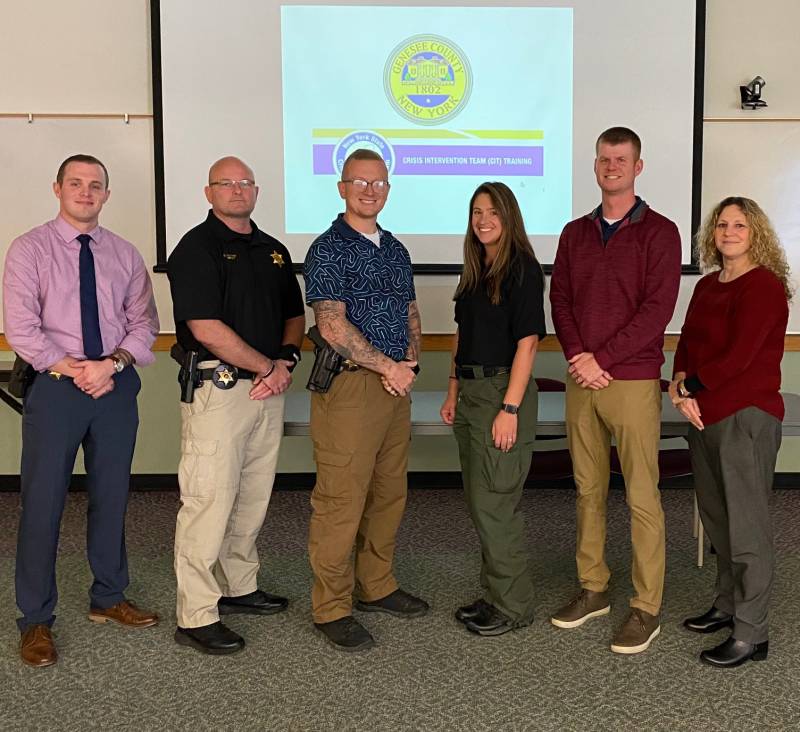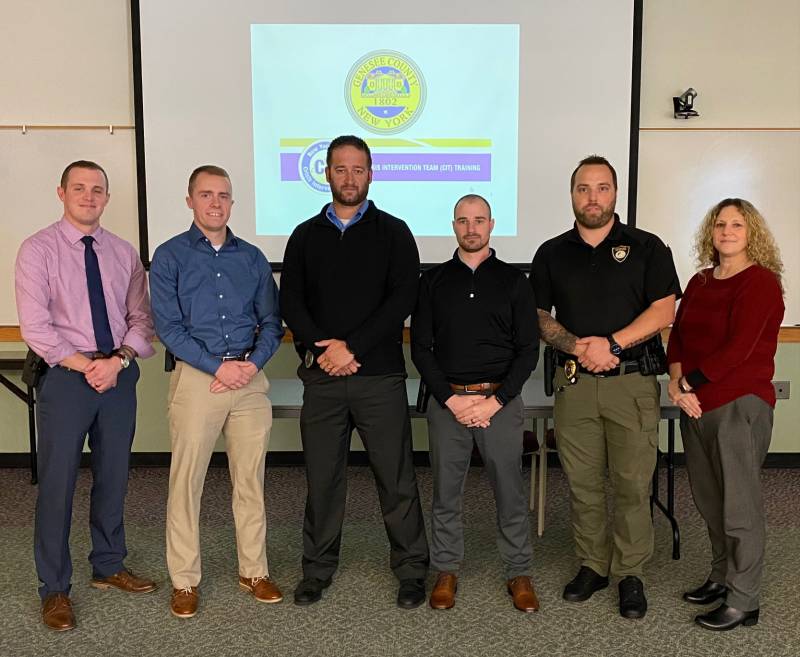
Photo by Joanne Beck
Sheriff’s deputies encounter a lot of different scenarios when out on patrol, and after a weeklong training on various mental health issues, several of them will be more versed to handle crisis intervention training in this area as well, county Mental Health Director Lynda Battaglia says.
Battaglia and co-facilitator David Moore, an investigator with the Genesee County Sheriff’s Office, wrapped up the 40-hour course with eight graduates Friday at Genesee Community College.
“It’s a co-instructor, co-facilitated course taught by law enforcement and mental health to really bring the disciplines together. We know that law enforcement responds quite frequently to individuals that are in crisis — emotional crisis, or they have mental health concerns -- and law enforcement needs to be prepared on how to, you know, appropriately respond and assist the individual with the help that they need,” Battaglia said. “We do scenario-based training, we do a lot of education on mental health. We talk about Alzheimer's, we talk about developmental disabilities, we talk about substance use, adolescents, juveniles -- we bring in family members and consumers or individuals who are in recovery. We brought in community resources this week. And it was a great opportunity to connect law enforcement with mental health so that they know that we are here for them, and vice versa.”
The course had been offered some years ago, and more recently, police agencies have been sending their employees to similar training in other counties, Moore said. He and Battaglia just completed an instructor’s course to be able to offer it here, and they plan to do so regularly for the Sheriff’s Office, and Batavia and Le Roy police departments.
“And it's been, I think, a really great experience for our people too, because it's been tough to almost establish and build that relationship with our mental health professionals in the area. And I think that this was a great opportunity to educate them on exactly what resources we have available,” Moore said. “And in doing so, I mean, putting faces with law enforcement and mental health in this area, and actually being able to come together and work together to provide that better experience and a higher level of care for the residents in Genesee County. So, I think that this has been fantastic for our guys, and I look forward to continuing to do that for other members in this county too.
“So ultimately, we are public servants. We do have to provide a service to Genesee County residents, and as work professionals, we need to be held to that standard. So I think this is definitely a step in the right direction,” he said.
Battaglia added that it’s an opportunity to “really transform” the county’s crisis response system. Law enforcement may go out on a call, and mental health responds with some additional assistance to law enforcement and the community “so that they have a well-rounded approach when somebody calls in distress,” she said.
For example, if deputies go out for someone who seems a bit incoherent or disoriented and is a little lost, “then you know, part of this training is to equip law enforcement with slowing things down and remembering you’re working with everybody, so this could be somebody with Alzheimer’s and how do you approach that using the appropriate tools and skill set to handle the situation,” Battaglia said.
The course not only went into specifics, but there was also a section about what is mental illness, and the variety of different factors involved, she said.
“You could have a mental illness and substance use addiction as well as medical problems,” she said. “So, that's a lot for one person to handle. So you know, equipping law enforcement with the tools on how to respond appropriately to somebody who has a whole host of issues and concerns that they need help with just better equips police.”
What did the class members walk away with? Sergeant Kyle Krzemien has learned a lot from prior training and being on the job, but he did pick up a valuable reminder when dealing with folks he sees who are typically going through some type of crisis.
“Whether it's small or big, it's really big to them. And just finding a way to slow down and just have a conversation with people and be a good listener, tends to help people out,” he said. “So just slowing down and being a good listener and finding ways to deal with certain types of disorders that people have. There's ways to … talk to people with schizophrenia and stuff like that.”

Photo by Joanne Beck
